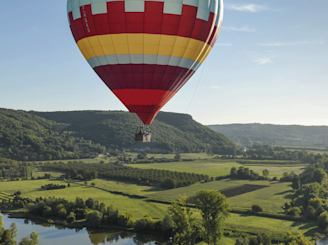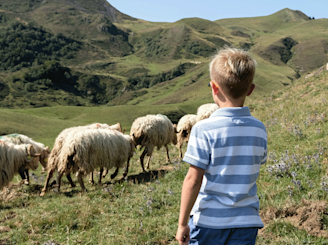1. The market and the riverbanks
It is advisable to arrive early in the morning to take in the hustle and bustle of Bayonne Halles, the covered market, the real commercial lifeblood of the historic centre. Once you’ve finished breakfast at Lionel Raux, the pastry-maker’s the most reputed of all, then you can begin your stroll through the stalls of the market. Once your shopping basket’s full, it’s time to head off through the pedestrian streets on the left bank of the Nive and the Adour to wander up rue Poissonnerie to rue d’Espagne, the town’s most vibrant street.
Covered market at the Halles from Monday to Friday from 7am to 1:30pm, Saturday (July, August) from 6am to 2pm, Sunday from 8am to 1:30pm.
Market on Saturday morning on the Halles square.
2. The cathedral and the cloister
The pedestrian heart of Grand Bayonne is a preserved historic sector crowned by its Cathedral of Saint Mary (and its cloister). Before visiting the impressive Gothic-styled monument, built between the 12th and 16th centuries, enjoy a bite of lunch at Mange Disques (5, rue des Prébendes), a highly-original restaurant and coffee shop. The recently-renovated cathedral has been a UNESCO-listed world heritage of Humanity site since 1988, a stopping place on the Santiago de Compostela route. The Gothic cloister, which is also a former cemetery, is one of the most extensive in France.
Free admission to the cloister and the cathedral.
Every day from Monday to Saturday from 7am to 7pm. No visits during religious services.
3. The Basque Museum and Petit Bayonne
The other side of the Nive called Petit Bayonne, with its famous narrow backstreets and its brightly-coloured houses, is the hot-spot for the Bayonne Festival. It is also the student district, with the university, situated in Château Neuf, and its Thursday evenings are well-known for parties and celebrations. Petit Bayonne, its riverbanks, its squares, its many bars and restaurants, is also home to the Basque and Bayonne History Museum. After visiting the largest ethnographic museum in the Basque Country where 2,000 objects and works of art bear witness to Basque identity and its traditions, enjoy lunch in one of the town’s best gastronomic restaurants, Auberge du Cheval-Blanc run by Jean-Claude Tellechea, who has been a starred chef for some 20 years.
Basque Museum, 37 quai des Corsaires, +33 (0)5 59 59 08 98, price €6.50, €4 (reduced) and €5 (groups), free for the under 26s and every 1st Sunday of the month.





